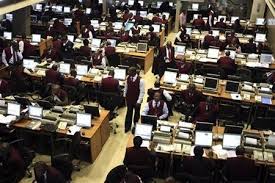There are no clear indications the Nigerian stock market will perform better in the second half (H2) of 2015 and many players who want to moderate losses may achieve little.
Before now, most stock investors had offloaded shares at significant discount in H1 following the waves of limited fund inflows.
Long term equity holders got battered when their equities value were eroded in excess of N800 billion.
The market was worse off due mainly to foreign equity buyers’ bearish sentiments for naira assets, macroeconomic uncertainties with over 50 per cent decline in oil price, issues around forex (FX), and weak corporate earnings released at the Lagos bourse.
With no clearer solution in view, these factors will continue to drag down the equities market in H2.
Poor H1 outing
Following listed companies’ poor outing in H1, most of them known for rewarding shareholders with interim dividend payouts routed for delays till year end.
Most stock buyers believe that the recent determination by companies to delay or deprive them of interim dividend payouts is enough to irk shareholders and whet their appetite for Nigerian stocks.
Also, as stock market goes through the murky waters of H2, issues such as the recapitalisation of capital market operators (CMOs) will shape the new order that will emerge after the September deadline given by the Securities and Exchange Commission (SEC).
Lagos, Nairobi
“Both Lagos and Nairobi stock markets have declined this year, by -9.3 per cent and -13.6 percent year-to-date (ytd) respectively, whereas the far more liquid and larger Johannesburg bourse has gained 5.4 per cent,” said research analysts at FBN Capital.
“Lagos has been the more erratic, gaining 20 per cent between March 20 and April 13 on an election-driven surge since shedding -11.9 per cent.
“This downward shift on the NSEASI is traceable to poor listed company results and an investors’ sense of drift since the handover to the new administration on May 29.”
To date, the flow of deals at the NSE is controlled largely by foreign investors.
But the latest trading figures from major custodians and market operators on their foreign portfolio investments (FPIs) showed that foreign investors ceded about N10.12 billion worth of equity investment to local investors in June.
However, total transactions (which include equities sales or liquidation of portfolio investments and equities purchases) increased to N203.45 billion (about $1.04 billion) in June 2015, up 39.88 per cent or N58 billion from N145.45 billion in May.
FPI transactions decreased to N69.65 billion, down by N10.12 billion or 12.69 per cent from N79.77 billion in May; domestic transactions increased from N65.68 billion to N133.8 billion in the same period, an upward swing of 103.71 per cent.
In H1, foreign investors accounted for 52.87 per cent of equity deals, domestic investors accounted for 47.13 per cent.
Total transactions in the equities market from January to June 2015 amounted to N1.113 trillion, according to the figures of domestic and foreign portfolio participation in equity trading.
Further weakness anticipated
“The offshore community expects a third devaluation in one year, and we do see another adjustment by end-year.
“Further weakness on the NSEASI would come from a sustained fall in the oil price, which would intensify pressures on the public finances, the balance of payments and the naira exchange rate,” said FBN Capital research analysts.
They also highlighted a general risk to frontier and emerging markets from monetary tightening expected this year in the United States.
In January, these analysts had forecast a minus 1 per cent loss for the index over the full year. Their forecast for equities market was on the basis of solely domestic factors.
“We think that the market has reached the bottom”, they added in their recent note titled, “On the ropes, off the ropes.”
Bearish outlook for equities
Analysts at United Capital said they continue to hold a bearish outlook for Nigerian equities in H2.
They linked their negative outlook to a combination of domestic and external macro headwinds that are not expected to subside in the near term.
“Our outlook in the beginning of the year was anchored solely on the direction of oil prices with a minus 4.5 per cent return forecast for 2015 based on a base case oil price scenario of $55 per barrel (pb),” they said.
“We are more bearish now than we were at the beginning of the year for the following reasons:
“Foreign investor participation is yet to recover as exchange rate risk remains on the horizon; domestic participation has been at best speculative, and is expected to remain so until interest is rekindled by increased FPI inflows;
“An imminent rate hike in the U.S. – though appears to have been modestly priced into emerging market assets – remains a key risk especially when the post-election one-day outlier return performance of 8.1 per cent is discounted.”
Banks’ earnings outlook negative
The outlook for banks’ earnings remains negative and could further pull back equities”, according to United Capital analysts.
They are also more bearish on equities because “the possibility of a further currency adjustment would pass on to consumer companies, though this may be a catalyst for possible FPI comeback.
“Expected high interest rate could potentially make fixed income instruments more attractive to large institutional domestic investors.”
Primary market activities in 2015 have been very low as the market witnessed just two Initial Public Offerings (IPOs) so far this year.
These are Haldane McCall Real Estate Investment Trust (HMK REIT) IPO of 2.6 billion units at N5.15 each in January; and PAC Asset Management Limited Balanced Fund which opened on February 4 and closed on March 13.
The stock market witnessed more Rights Issues in 2015 with bulk being in the pipeline since late 2014.
Uncertainty likely till end Q3
Investors interested in the Nigerian market sit on the fence for the announcement of ministers by President Muhammadu Buhari, who is expected to pick a mix of politicians and technocrats next month.
“The market remains bearish as poor H1 results continue to dampen investor confidence,” said Bismarck Rewane of Financial Derivatives Company (FDC), adding that there is still uncertainty “as investors grope in the dark.”
Looking into the third quarter (Q3), FDC analysts said performance will remain subdued in the absence of a firm policy direction.
They explained in their latest monthly economic news and views that “key appointments will serve as the much desired catalyst for a market rally. Currency devaluation will attract foreign institutional investors and stimulate the market.
“Uncertainty in the Nigerian Stock Exchange will persist till the end of Q3. Stocks will witness price correction for poor corporate earnings results.
“New rules on debtor ‘name and shame’ by the Central Bank of Nigeria (CBN) is forcing mergers and acquisitions. It is forcing asset sale and pushing stock prices down.
“Increased scrutiny and Bank Verification Number (BVN) are killing identity theft and forcing consolidation of investors.”
Analysts at FSDH Merchant Bank added: “We expect the equity market to remain relatively flat in August. The policy direction of the current administration may set the path the equity market would follow in the short term.
“Speculative investors in the equity market may adopt a hold strategy while the long-term investors may adopt a long positions in some value stocks.”













